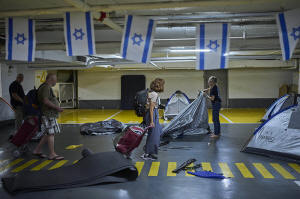Trump says US and Iranian officials will talk next week as ceasefire
holds
[June 26, 2025]
By JON GAMBRELL, DAVID RISING and FARNOUSH AMIRI
DUBAI, United Arab Emirates (AP) — Israel and Iran seemed to honor the
fragile ceasefire between them for a second day Wednesday and U.S.
President Donald Trump asserted that American and Iranian officials will
talk next week, giving rise to cautious hope for longer-term peace.
Trump, who helped negotiate the ceasefire that took hold Tuesday on the
12th day of the war, told reporters at a NATO summit that he was not
particularly interested in restarting negotiations with Iran, insisting
that U.S. strikes had destroyed its nuclear program. Earlier in the day,
an Iranian official questioned whether the United States could be
trusted after its weekend attack.
“We may sign an agreement, I don’t know,” Trump said. “The way I look at
it, they fought, the war is done."
Iran has not acknowledged any talks taking place next week, though U.S.
Mideast envoy Steve Witkoff has said there has been direct and indirect
communication between the countries. A sixth round of U.S.-Iran
negotiations was scheduled for earlier this month in Oman but was
canceled after Israel attacked Iran.
Earlier, Trump said the ceasefire was going “very well,” and added that
Iran was “not going to have a bomb, and they’re not going to enrich.”
Iran has insisted that it will not give up its nuclear program. In a
vote underscoring the tough path ahead, its parliament agreed to
fast-track a proposal that would effectively stop the country’s
cooperation with the International Atomic Energy Agency, the U.N.
watchdog that has monitored the program for years.
Ahead of the vote, Parliament Speaker Mohammad Bagher Qalibaf criticized
the IAEA for refusing “to even pretend to condemn the attack on Iran's
nuclear facilities” that the U.S. carried out Sunday.

“For this reason, the Atomic Energy Organization of Iran will suspend
cooperation with the IAEA until security of nuclear facilities is
ensured, and Iran’s peaceful nuclear program will move forward at a
faster pace," Qalibaf told lawmakers.
IAEA Director General Rafael Mariano Grossi said he wrote to Iran to
discuss resuming inspections of their nuclear facilities. Among other
things, Iran claims to have moved its highly enriched uranium ahead of
the U.S. strikes, and Grossi said his inspectors need to reassess the
country’s stockpiles.
“We need to return,” he said. “We need to engage.”
French President Emmanuel Macron said he hoped Tehran would come back to
the table. France was part of the 2015 deal with Iran that restricted
its nuclear program, but the agreement began unraveling after Trump
pulled the U.S. out in his first term. Macron spoke multiple times to
Iranian President Masoud Pezeshkian during the war.
International Atomic Energy Agency Director Rafael Grossi said Wednesday
that Iran must quickly resume cooperation with international inspectors,
telling French broadcaster France 2 that the IAEA had lost visibility
over sensitive nuclear materials since the onset of hostilities.
Grossi said Iran is legally obligated to cooperate with the IAEA under
the Non-Proliferation Treaty.
“During a war, inspections are not possible. But now that hostilities
have ceased, and given the sensitivity of this material, I believe it is
in everyone’s interest that we resume our activities as soon as
possible," he said.
Iran has long maintained that its nuclear program is peaceful, and U.S.
intelligence agencies have assessed that Tehran is not actively pursuing
a bomb. However, Israeli leaders have argued that Iran could quickly
assemble a nuclear weapon.
Israel is widely believed to be the only Middle Eastern country with
nuclear weapons, which it has never acknowledged.
Questions over effectiveness of the US strikes
The Israel Atomic Energy Commission said its assessment was that the
U.S. and Israeli strikes have “set back Iran’s ability to develop
nuclear weapons by many years.” It did not give evidence to back up its
claim.
The U.S. strikes hit three Iranian nuclear sites, which Trump said
“completely and fully obliterated” the country's nuclear program. When
asked about a U.S. intelligence report that found Iran’s nuclear program
has been set back only a few months, Trump scoffed and said it would at
least take years to rebuild.
Iran’s Foreign Ministry spokesman, Esmail Baghaei, confirmed that the
strikes by American B-2 bombers using bunker-buster bombs had caused
significant damage.

[to top of second column]
|

People fold tents at an underground shelter they stayed in during
the war with Iran after the ceasefire was announced in Tel Aviv,
Israel, Tuesday, June 24, 2025. (AP Photo/Ohad Zwigenberg)

“Our nuclear installations have been badly damaged, that’s for
sure,” he told Al Jazeera on Wednesday, refusing to go into detail.
He seemed to suggest Iran might not shut out IAEA inspectors for
good, noting that the bill before parliament only talks of
suspending work with the agency, not ending it. He also insisted
Iran has the right to pursue a nuclear energy program.
“Iran is determined to preserve that right under any circumstances,”
he said.
Witkoff said late Tuesday on Fox News' “The Ingraham Angle” that
Israel and the U.S. had achieved their objective with “the total
destruction of the enrichment capacity” in Iran, and Iran's
prerequisite for talks — that Israel end its campaign — had been
fulfilled.
“The proof is in the pudding,” he said. “No one's shooting at each
other. It's over.”
Hopes for a long-term peace agreement
An Israeli official, speaking on condition of anonymity to discuss
internal deliberations, said the ceasefire agreement with Iran
amounted to “quiet for quiet,” with no further understandings about
Iran's nuclear program going ahead.
Witkoff told Fox News that Trump is now looking to land “a
comprehensive peace agreement that goes beyond even the ceasefire.”
“We’re already talking to each other, not just directly, but also
through interlocutors,” Witkoff said, adding that the conversations
were promising.
However, Baghaei, the Iranian spokesman, said Washington had
“torpedoed diplomacy” with its attacks on nuclear sites, and that
while Iran in principle was always open to talks, national security
was the priority.
“We have to make sure whether the other parties are really serious
when they're talking about diplomacy, or is it again part of their
tactics to make more problems for the region and for my country,” he
said.
Grossi said Iran and the international community should seize the
opportunity of the ceasefire for a long-term diplomatic solution.
“Out of the ... bad things that military conflict brings, there’s
also now a possibility, an opening,” he said. “We shouldn’t miss
that opportunity.”
A rare video by Mossad
Israel revealed details of the intelligence and covert operations
that it said allowed the country to effectively target Iranian
military commanders, nuclear scientists and key facilities.
In a rare video released by Israel’s Mossad spy agency, chief David
Barnea thanked the CIA for being a key partner, and his own agents
for work over years to achieve what was “unimaginable at first.”

“Thanks to accurate intelligence, advanced technologies and
operational capabilities beyond imagination, we helped the air force
strike the Iranian nuclear project, establish aerial superiority in
Iranian skies and reduce the missile threat,” the agency said in a
Facebook post alongside the video.
Lt. Gen. Eyal Zamir, the military chief of staff, asserted that
commandos had operated secretly “deep inside enemy territory” during
the war.
Tehran on Tuesday put the death toll in Iran at 606, with 5,332
people wounded. The Washington-based Human Rights Activists group
released figures Wednesday suggesting Israeli strikes on Iran had
killed at least 1,054 and wounded 4,476.
The group, which has provided detailed casualty figures from
multiple rounds of unrest in Iran, said 417 of those killed were
civilians and 318 were security forces.
At least 28 people were killed in Israel and more than 1,000
wounded, according to officials.
In the past two weeks, Iran has executed six prisoners accused of
spying for Israel, including three on Wednesday.
___
Associated Press writers Josef Federman and Julia Frankel in
Jerusalem, Natalie Melzer in Nahariya, Israel, Chris Megerian and
Sylvie Corbet in The Hague, Netherlands, and Geir Moulson in Berlin
contributed to this report.
All contents © copyright 2025 Associated Press. All rights reserved |